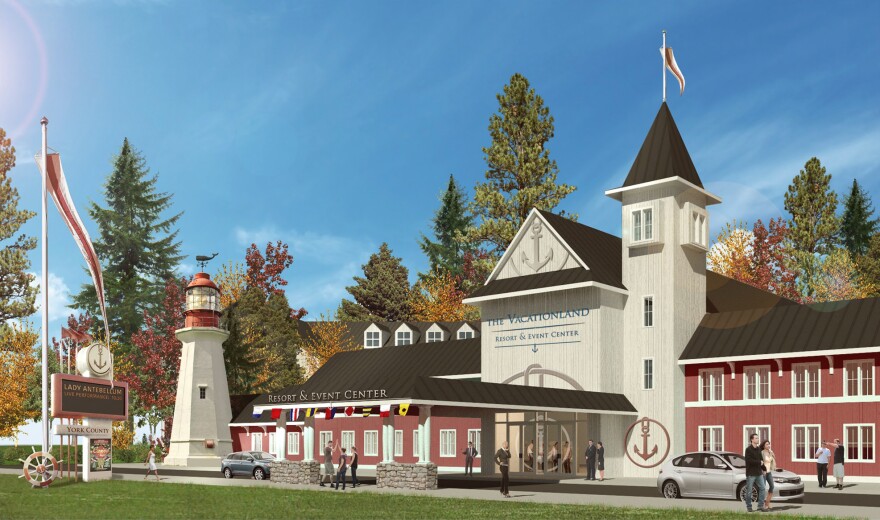A controversial campaign to build a York County casino is touting an analysis that says the project will bring millions of dollars in state revenues, thousands of jobs and a boost to the region’s household earnings. The analysis was paid for by Progress for Maine, the political action committee leading the campaign to approve Question 1.
Maine Public political correspondent Steve Mistler spoke with Maine Things Considered host Nora Flaherty about the projections and whether they should be taken at face value.
Flaherty: how skeptical should we be of this analysis?
Mistler: A couple of ways to look these types of reports — tend to look at them the same way voters view campaign promises from politicians. I don’t think it’s out of bounds to say that most of the time politicians overpromise and underdeliver. The same is true of casino campaigns, especially in Maine.
Let’s take the Oxford County casino that voters approved seven years ago. The campaign promised 1,700 year-round jobs and $60 million in annual revenue to the state. Oxford is considered a pretty successful gambling operation, but it’s fallen short of its campaign promises.
A report two years ago pegged the number of full-time jobs there at about 400, less than a quarter of what the campaign promised. According to the latests state revenue reports, Oxford provided about $32.5 million last year — a little more than half promised seven years ago.
It’s a similar situation at Hollywood Casino in Bangor, where revenues have been on the decline since the facility was approved in 2003 — to the point that the facility at one point asked the town for a significant property tax break.
By the way, the Bangor facility was the result of the campaign run by casino developer Shawn Scott, the same man — in fact the only person — who can hold the license if Question 1 is approved this year.
Flaherty: Does that mean these casino proposals are a bad deal for Maine?
Mistler: Not necessarily. In fact, Bangor officials credit the casino there for giving that city’s economic revival a bit of a boost. And the 400 or so people working at Oxford Casino would have to find work elsewhere if the casino wasn’t there.
Oxford also appears to be a bit of a draw for tourists, which may explain why the casino participated in the adopt-a-highway program for a stretch of highway in New Hampshire.
And both have contributed millions of dollars in state revenue — revenue that arguably would not otherwise be here. That said, the next person to argue that either casino has solved their respective region’s economic problems will likely be the first to do so.
Flaherty: I sometimes hear people say Maine can’t support a third casino. Didn’t Gov. Paul LePage say something like that when there were multiple casino referendums on the ballot in 2011?
Mistler: He did. Now, the governor has said that he doesn’t support gambling in general. But he seemed to be making an economic argument six years ago, not an ideological one.
Three years ago the Legislature commissioned a study about the viability of a third casino. It’s called the White Sands report, and it suggested that the state could support a third gambling facility under certain conditions.
The first is that it should be located in the southern part of the state. That would seem to bode well for Question 1, but the study also had a key caveat — that the developer of the third facility invest at least $250 million to make the casino a tourist destination.
There is nothing in Question 1 that requires that type of investment — or any investment at all.
Flaherty: So circling back to this study, it really seems like you’re saying take it with a grain of salt.
Mistler: Exactly. I mean, this is a lot like internal poll numbers that candidates often release to make them look good or to boost public interest. They would never release poll results — or in this case an economic forecast — if it’s unfavorable.
It’s also worth noting that the firm commissioned for this analysis has been hired by a number of other casino campaigns.
In 2002, it produced an analysis arguing that the state of Wisconsin should loosen gaming regulations to unleash the economic development potential of casinos there. Three years later, that same firm said more casinos would cost jobs in Milwaukee.
It just so happened that the firm was hired by a casino that could see a decrease in revenue if the other proposal was approved.
That’s just one example. And I’ve yet to find a single instance in which an analysis produced by this firm produced results that were counter to the goals of the campaign that hired them.
This story was originally published Sept 15, 2017 at 4:28 p.m. ET.



